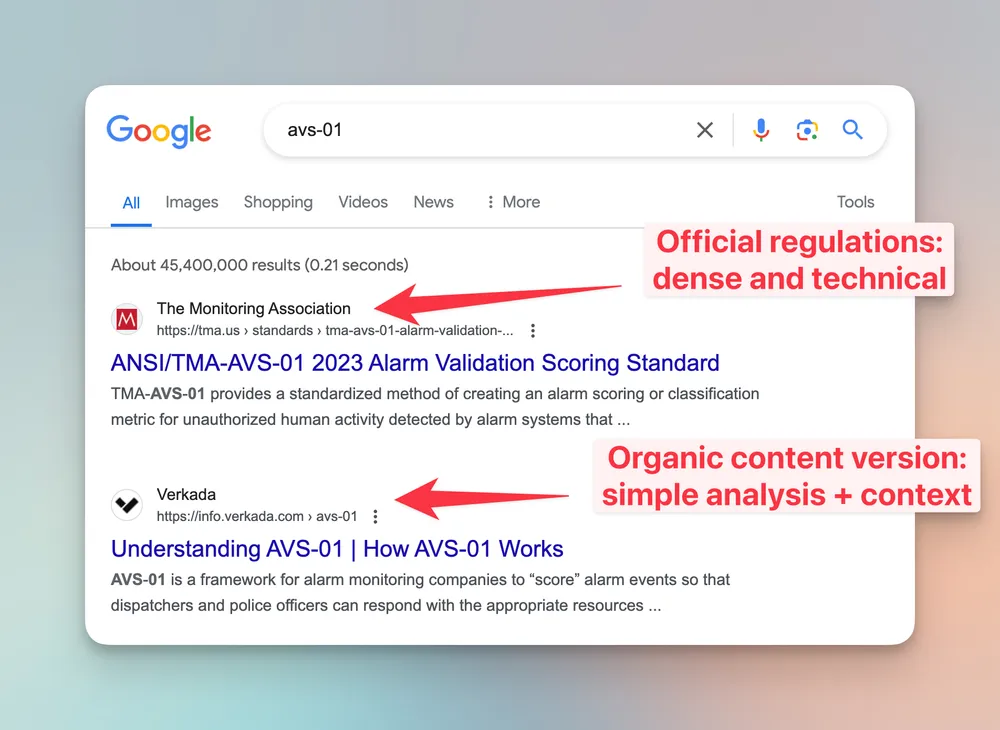Writing about industry news is a great way to raise your profile in the community, flex a little thought leadership, and (ideally) attract new traffic. But trends change quickly, and newsworthy events fade...
Industry regulations and federal policies, however, are on the minds of b2b clients long after they fade from the news.
App developers need to stay up on GDPR. Healthcare tech brands to stay up to date on HIPAA. Various industries are concerned with ESG.
This is a huge opportunity for content marketing teams to...
- Be helpful
- Stay timely
- Demonstrate your authority
- Engage new, targeted leads
And, depending on your industry, writing about these topics can be pretty low-hanging fruit.
Why even write about industry regulations?
If they affect your customer's industry, then they need all of the helpful information they can get.
Plus, from a content marketing perspective, this topic checks all of the strategic boxes:
- The long shelf life. Regulations endure and they don't change very often. Writing about them is an investment in content that will remain relevant for a while too.
- The very clear pain point. Having to alter your business practices, under fear of major penalties, is a drag to say the least.
- The self-selective audience. Any sort of policy is written for a very specific audience. When it happens to be your audience, the targeting is built in.
- The competition is often pretty low. If the only content available is extremely dry, legislative stuff, you have an opportunity to make it way more accessible.
- The gratitude. Having access to an expert who understands abstruse regulations is a comfort.
How your organic SEO content brings value to the industry
We've discussed how translating developer docs to SEO content is largely a matter of providing additional context. The principles hold true for writing about industry regulations.
The goal is to make this info more accessible for your audience. (Which means making it more readable but also more easily found via search engines.)
Here are few ways your SEO content can do that:
- Translate policy into readable English. Policies are often written in dense, legalistic format. You can adapt it to a more accessible, comprehensible format for your audience.
- Provide practical context. Explain how these new standards interact with current industry practices and dynamics. Put this abstract jargon in a real-world context.
- Suggest compliance strategies and solutions. In addition to practical context, you can present options for action.
- Introduce people to your unique solutions. The audience is looking for solutions, and your product might offer exactly what they need.
That last point is, of course, why we’re doing this to begin with. We’re content marketers, not Wikipedia.
Example: Verkada takes on a new industry standard
If you search “AVS-01” in Google, the #1 page is a very dense set of regulations published by a major industrial association. Right below that, in the #2 spot, is a much more accessible (top-funnel marketing) post published by the folks at Verkada.
So, once you click on that dense official regulation page, and your eyes gloss over, you can click over to Verkada’s page for a translation into simple English.
The ércule app automatically identifies and groups pages that are showing a decline in traffic.

Why would Verkada weigh in on this topic? Easy: it affects the work-lives of their target audience. (Verkada sells video security solutions to businesses, schools, and government facilities.)
Plus – and this is important – this particular search query has some traffic and the competition is winnable. And that’s a prime opportunity.
What did they add to the industry conversation?
The short answer is: context, practical advice, and a (tasteful) invitation to explore Verkada’s products.

Specifically, they devoted subheadings to the following topics :
- How the new industry policy actually works
- What are the essential categories to understand
- What this means for anyone in charge of facilities security
- How a particular kind of technology can support these changes
…and, at the bottom of this informative post, the all-important tie-in to Verkada’s product.
The branded content is relatively minor in this post. This focus on information probably helped them climb the ranks in search.

Next steps
Ready to win new leads by providing vital education and putting them at ease? Start with a bit of customer research...
- Find the regulations and policies that are at the top of your audience’s mind. Customers are the best resource here, but your sales teams and C-suite will probably already be aware of the biggest issues.
- Assess the viability for those topics in search (ie. volume and competition). Some topics like GDPR or HIPAA are extremely competitive. However, you might find longer-tail queries that are less competitive and better tailored to your audience anyway.
- Research the top-ranking content and figure out your opportunity. If the top-ranking pages are broad and shallow, consider something targeted and deep.
- Keep the focus on education, not promotion. Spend 75% of the post focused on the policy and the other 25% on how your product can help. If it can’t actually help then you probably shouldn’t be writing about it.
And remember: in all matters, helpfulness is the guiding light!
Do you have any lingering questions about how to get started? Let’s chat about them.
